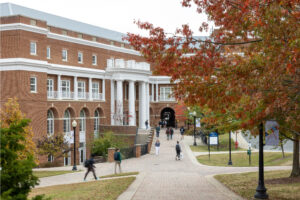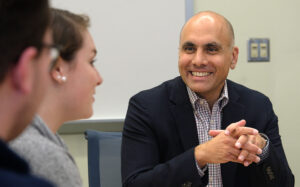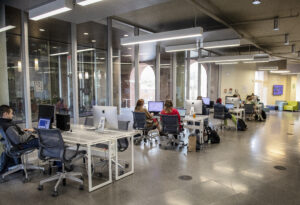
The University of Mary Washington has long been a leader in higher education adapted to a global digital environment. Now with the acceleration of artificial intelligence (AI), it has centered this work, bringing together faculty and students from communication and digital studies, computer science, humanities, social sciences, arts and other fields to explore AI’s applications and implications in a liberal arts context. The Center for AI and the Liberal Arts at UMW launches this fall 2025.
UMW’s Center for AI and the Liberal Arts will serve as a hub for research, teaching and public engagement. Led by Professor of Communication and Digital Studies Anand Rao, the Center focuses on valuable knowledge and skills essential for students and educators.
“We’re not just preparing students for the classroom — we’re preparing them for the world beyond it, and that means preparing them for an AI-driven future,” said Rao. “It’s essential to understand what AI will mean for the workforce, education, and our daily lives. Our students won’t just learn about AI — they’ll help shape the conversation.”
The Center’s launch also aligns with UMW’s broader mission to foster critical thinking, ethical leadership and civic engagement in a rapidly evolving digital world. With course topics already on the schedule this summer and fall, the Center has programming underway to support students, faculty and the broader community.
The Center will support a range of initiatives, including:
- Courses and Curriculum Development: New interdisciplinary classes that examine AI through the lenses of ethics, communication, digital studies and the humanities.
- Student Projects and Research: Opportunities for students to engage in hands-on AI projects, including chatbot development, augmented debate and AI explainability.
- Faculty Collaboration and Grants: Support for faculty research and grant proposals that explore AI’s impact on education, society and culture.
- Public Events and Outreach: Workshops, guest lectures and community partnerships, including public workshops.
A key distinction of UMW’s work in this realm will be the educational approach, in not just teaching how AI works, but in asking why it matters, who it impacts and how we can use it responsibly. Students will explore AI across interdisciplinary studies – for example, philosophy, sciences, ethics and the humanities – gaining a deeper understanding of its societal implications.
“In today’s AI landscape, we need people who understand not just the technology, but its limitations and how to apply it ethically across industries,” said Rao. “It’s not enough to have engineers who build AI systems; we also need critical thinkers to question them, policymakers to navigate the societal impact, artists and writers to explore cultural meaning, and ethical leaders to ensure technology serves the common good.”
UMW students, in particular, will be prepared to bridge the gap between technical teams and broader business or social concerns throughout their careers.

Rao, a nationally recognized expert in AI education, has presented at international conferences, including the AI & Big Data Expo in London and the Ai4 Conference in Las Vegas. His work on AI pluralism and debate-centered instruction has been featured in Higher Education Digest and other academic venues, and he has edited and contributed to a new book, to be published this fall, focused on AI pluralism, outlining strategies to develop more explainable and aligned AI systems based on argumentation and debate. He is the co-author and co-editor of the 2023 book, Chat(GPT): Navigating the Impact of Generative AI Technologies on Educational Theory and Practice, which debuted as the No. 1 new release in Curricula and in the Top 10 for Educational Professional Development.
This summer, Rao introduced a complimentary one-credit course for incoming and current Mary Washington students that provides the tools to understand and apply AI in an effective and ethical way, particularly in an academic setting. The online, self-paced course – Introduction to AI – shares foundational knowledge about how AI works, how to integrate it into work and approach it with critical awareness.

In addition to the summer course, Rao will introduce a more extensive fall course DGST 301N: AI and Society. This course will delve deeper into the implications of AI on various career paths and personal interests. Students will have the opportunity to build their own chatbots, engage in discussions and debates, and attend guest lectures from leading experts. The course will be held in UMW’s Hurley Convergence Center Digital Auditorium and will include both in-person and online components. Through the hands-on course, students will harness AI tools, tackle ethical, creative and societal challenges through real-world projects, and develop practical skills to become informed leaders in the AI era. Students can enroll in this semester-long course during the registration process or as they add or drop classes, and seats will be available for transfer and incoming first-year students.
Rao also leads community discussions and speaks at regional events, serving as an expert on AI in education, and most recently joined a panel for the Fredericksburg Regional Chamber of Commerce. He has worked with the UMW Foundation Board through strategic planning and AI-guided sessions. Foundation Board Member Donna Sheehan Gladis ‘68 and her husband Steve, have been so impressed with the work and the initiative that they provided seed funding for the Center through a $100,000 gift over the next five years.
“We’ve seen firsthand how quickly AI technology is changing the world — and how important it is for students to be prepared. That’s why we’re so excited to help launch the AI Center at the University of Mary Washington,” said the Gladises. “We want liberal arts students to graduate with not only a strong foundation in critical thinking and creativity, but also the AI skills to apply those strengths in today’s high-tech workplace. Our hope is that this Center for AI and Liberal Arts will inspire curiosity, spark innovation, and ensure UMW graduates are ready to thrive, compete, and lead in whatever future they choose.”
Visit the Center for AI and the Liberal Arts at UMW website to learn more and see a schedule of upcoming events. Support the work of the Center for AI and the Liberal Arts directly through a gift. Learn more about supporting programs like the Center for AI and the Liberal Arts through the Giving to Mary Washington website.
